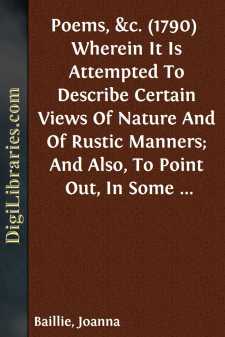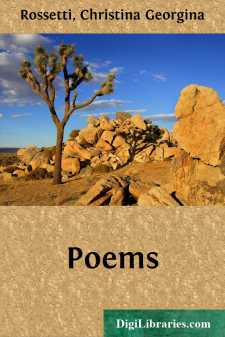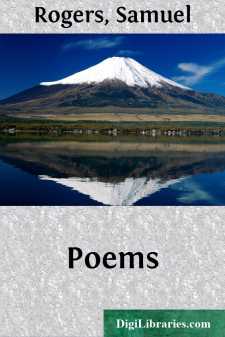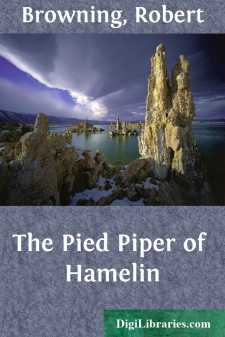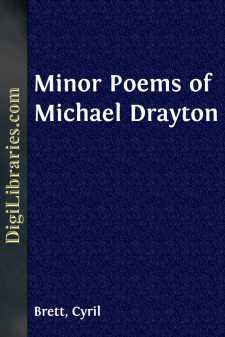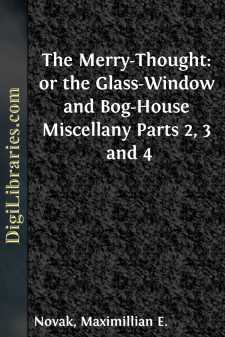Poetry
- American 96
- Ancient, Classical & Medieval 41
- Asian 15
- Australian & Oceanian 11
- Canadian 11
- Caribbean & Latin American 5
- Children's Poetry & Nursery rhymes 51
- Continental European 11
- English, Irish, Scottish, Welsh
- General 483
- Inspirational & Religious 7
- Middle Eastern 3
English, Irish, Scottish, Welsh Books
Sort by:
by:
William Watson
PRELUDE The mighty poets from their flowing storeDispense like casual alms the careless ore;Through throngs of men their lonely way they go,Let fall their costly thoughts, nor seem to know.—Not mine the rich and showering hand, that strewsThe facile largess of a stintless Muse.A fitful presence, seldom tarrying long,Capriciously she touches me to song—Then leaves me to lament her flight in vain,And...
more...
by:
Joanna Baillie
A WINTER DAY. The cock, warm roosting 'midst his feather'd dames,Now lifts his beak and snuffs the morning air,Stretches his neck and claps his heavy wings,Gives three hoarse crows, and glad his talk is done;Low, chuckling, turns himself upon the roost,Then nestles down again amongst his mates.The lab'ring hind, who on his bed of straw,Beneath his home-made coverings, coarse, but...
more...
by:
Jean Ingelow
ROSAMUND. His blew His winds, and they were scattered. 'One soweth and another reapeth.' Ay,Too true, too true. One soweth—unawareCometh a reaper stealthily while he dreams—Bindeth the golden sheaf, and in his bosomAs 't were between the dewfall and the dawnBears it away. Who other was to blame?Is it I? Is it...
more...
by:
Jean Ingelow
DIVIDED. I. An empty sky, a world of heather, Purple of foxglove, yellow of broom;We two among them wading together, Shaking out honey, treading perfume. Crowds of bees are giddy with clover, Crowds of grasshoppers skip at our feet,Crowds of larks at their matins hang over, Thanking the Lord for a life so sweet. Flusheth the rise with her purple favor, Gloweth the cleft with her golden...
more...
Morning and eveningMaids heard the goblins cry:"Come buy our orchard fruits,Come buy, come buy:Apples and quinces,Lemons and oranges,Plump unpecked cherries,Melons and raspberries,Bloom-down-cheeked peaches,Swart-headed mulberries,Wild free-born cranberries,Crab-apples, dewberries,Pine-apples, blackberries,Apricots, strawberries;--All ripe togetherIn summer weather,--Morns that pass by,Fair...
more...
by:
Samuel Rogers
ANALYSIS OF THE FIRST PART. THE Poem begins with the description of an obscure village, and of the pleasing melancholy which it excites on being revisited after a long absence. This mixed sensation is an effect of the Memory. From an effect we naturally ascend to the cause; and the subject proposed is then unfolded with an investigation of the nature and leading principles of this faculty. It is...
more...
by:
Various
WITH PIPE AND BOOK. With Pipe and Book at close of day, Oh, what is sweeter, mortal, say? It matters not what book on knee, Old Izaak or the Odyssey, It matters not meerschaum or clay. And though one's eyes will dream astray, And lips forget to sue or sway, It is "enough to merely be," With Pipe and Book. What though our modern skies be gray, As bards aver, I will not pray For...
more...
by:
Robert Browning
THE PIED PIPER OF HAMELIN Listen I.Hamelin Town's in Brunswick,By famous Hanover city;The river Weser, deep and wide,Washes its wall on the southern side;A pleasanter spot you never spied;But, when begins my ditty,Almost five hundred years ago,To see the townsfolk suffer soFrom vermin, was a pity. ListenRats!They fought the dogs and killed the cats,And bit the babies in the cradles, And ate the...
more...
by:
Cyril Brett
INTRODUCTION Michael Drayton was born in 1563, at Hartshill, near Atherstone, in Warwickshire, where a cottage, said to have been his, is still shown. He early became a page to Sir Henry Goodere, at Polesworth Hall: his own words give the best picture of his early years here. His education would seem to have been good, but ordinary; and it is very doubtful if he ever went to a university. Besides the...
more...
INTRODUCTION In an address to the American Society for Eighteenth Century Studies at the 1983 annual meeting, Roger Lonsdale suggested that our knowledge of eighteenth-century poetry has depended heavily on what our anthologies have decided to print. For the most part modern anthologies have, in turn, drawn on collections put together at the end of the eighteenth century and the beginning of the next,...
more...



